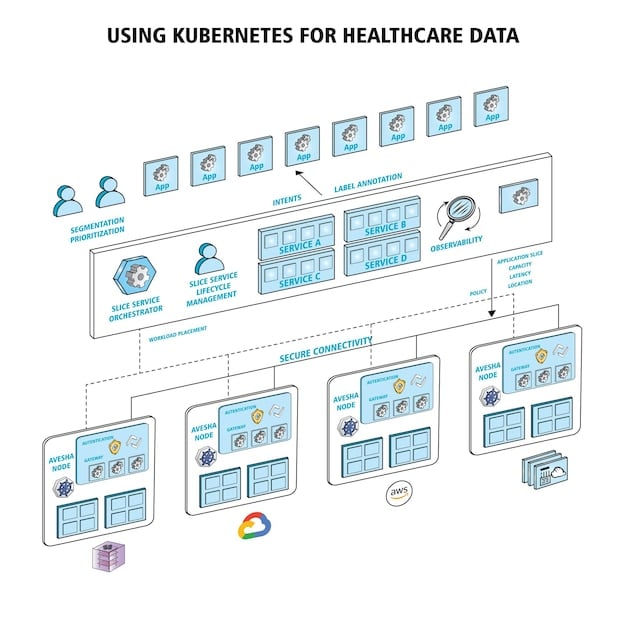US AI Research: Federated Learning Advances in Healthcare

US AI research is making significant strides in federated learning for healthcare, enabling collaborative model training across institutions while preserving patient data privacy.
The landscape of US AI Research: A Deep Dive into the Latest Advancements in Federated Learning for Healthcare Applications is undergoing a transformative shift. Federated learning, with its promise of collaborative model training without compromising patient data privacy, is at the forefront of this evolution. Let’s delve into the specifics of this exciting field.
Understanding Federated Learning in US Healthcare
Federated learning is emerging as a pivotal technology in the US healthcare sector. It allows multiple healthcare organizations to collaboratively train machine learning models without directly sharing sensitive patient data. This approach addresses key challenges related to data privacy and security, enabling broader participation in AI research.
What is Federated Learning?
Federated learning is a decentralized machine learning technique where models are trained across multiple decentralized devices or servers holding local data samples, without exchanging them. The key is to use the local data to update the model locally and then aggregate those updates securely.
Key Benefits for Healthcare
- Enhanced Data Privacy: Data remains within the secure confines of each healthcare institution.
- Collaborative Research: Enables multiple hospitals and research centers to contribute to a common AI model.
- Improved Model Generalization: Training on diverse datasets from various sources improves model accuracy and robustness.
- Regulatory Compliance: Helps comply with stringent data protection regulations like HIPAA.
By leveraging federated learning, the US AI research community can develop more robust and reliable AI models for healthcare applications while adhering to strict privacy standards. This collaborative effort has the potential to revolutionize diagnostics, treatment planning, and patient care.

The Role of US Institutions in Federated Learning Research
US institutions are playing a leading role in advancing federated learning research. Universities, hospitals, and technology companies are actively involved in developing and deploying federated learning solutions for various healthcare applications. Their contributions are essential for shaping the future of AI in medicine.
Leading Research Universities
Several US universities are at the forefront of federated learning research. These institutions are conducting cutting-edge studies, developing new algorithms, and publishing influential papers that are driving the field forward.
Hospital Networks and Healthcare Providers
Hospital networks are increasingly adopting federated learning to improve patient care and operational efficiency. These collaborations enable the development of AI models that can predict patient outcomes, optimize resource allocation, and personalize treatment plans.
- Mayo Clinic: Pioneering federated learning for cardiovascular disease prediction.
- Mount Sinai Health System: Implementing federated learning for cancer diagnosis.
- Partners HealthCare: Developing federated learning solutions for mental health analysis.
These institutions not only contribute data but also provide real-world validation of federated learning models, ensuring their applicability and effectiveness in clinical settings. Their involvement is critical for translating research findings into tangible benefits for patients and healthcare providers. Through these coordinated efforts, US institutions are cementing their position as global leaders in federated learning for healthcare.
Applications of Federated Learning in Healthcare
Federated learning is finding diverse applications across the healthcare spectrum, from diagnostics and treatment to drug discovery and personalized medicine. The flexibility and privacy-preserving nature of this technology make it ideal for tackling complex medical challenges.
Diagnostic Imaging
Federated learning enhances diagnostic accuracy by enabling collaborative analysis of medical images without sharing raw data. This approach allows radiologists to access a broader range of cases, improving their ability to detect subtle patterns and anomalies.
Drug Discovery
By combining data from multiple research labs and pharmaceutical companies, federated learning can accelerate the drug discovery process while protecting proprietary information. This collaborative approach enables researchers to identify potential drug candidates and predict their efficacy more efficiently.

Personalized Medicine
Federated learning facilitates the development of personalized treatment plans by analyzing patient data from various sources. This approach allows clinicians to tailor therapies to individual needs while maintaining patient privacy.
- Predictive Modeling: Predicting patient outcomes based on historical data.
- Treatment Optimization: Identifying the most effective treatments for specific patient profiles.
- Remote Monitoring: Improving patient care through continuous monitoring and data analysis.
Federated learning is revolutionizing various aspects of healthcare by providing a means to leverage data collaboratively, enhancing research, and improving patient outcomes, all while maintaining strict data privacy and security.
Challenges and Considerations in US AI Federated Learning
While federated learning offers numerous benefits, it also presents unique challenges that must be addressed to ensure its successful implementation in the US healthcare sector. These challenges range from technical issues to ethical considerations, requiring a multi-faceted approach to overcome.
Technical Challenges
Several technical hurdles need to be addressed to optimize the performance of federated learning systems. These include dealing with heterogeneous data, ensuring model convergence, and mitigating communication bottlenecks.
Ethical and Regulatory Considerations
Ethical considerations are paramount when implementing federated learning in healthcare. Issues such as data ownership, algorithmic bias, and patient consent must be carefully addressed to ensure fairness and transparency.
Data Governance and Security
Effective data governance and security protocols are essential to protect patient data within federated learning frameworks. This includes implementing robust encryption, access controls, and audit trails to prevent unauthorized access and misuse of data.
Addressing these technical, ethical, and regulatory challenges is crucial for the widespread adoption of federated learning in US healthcare, ensuring that its benefits are realized while safeguarding patient rights and data privacy.
Future Trends in Federated Learning for Healthcare
The future of federated learning in healthcare is promising, with ongoing research and development efforts focused on addressing current limitations and expanding its capabilities. Several key trends are expected to shape the field in the coming years.
Advancements in Privacy-Enhancing Technologies
Researchers are actively exploring new methods to further enhance the privacy of federated learning systems. These include techniques such as differential privacy, homomorphic encryption, and secure multi-party computation.
Integration with Edge Computing
Integrating federated learning with edge computing technologies can enable real-time data analysis and decision-making at the point of care. This approach can improve the efficiency and responsiveness of healthcare systems.
Standardization and Interoperability
Efforts to standardize federated learning protocols and data formats are essential to promote interoperability between different healthcare organizations and research institutions. This will facilitate broader collaboration and accelerate the development of new AI solutions.
As federated learning continues to evolve, it is poised to play an increasingly important role in transforming healthcare, enabling more personalized, efficient, and secure patient care.
The Impact on US Healthcare AI Research and Patient Outcomes
Federated learning is not just a technological advancement; it’s a paradigm shift with profound implications for both US healthcare AI research and patient outcomes. By enabling collaboration without compromising privacy, it unlocks new possibilities for improving healthcare delivery.
Enhanced Research Capabilities
Federated learning allows researchers to access a more diverse and comprehensive dataset, leading to more robust and generalizable AI models. This, in turn, accelerates the pace of discovery and innovation in healthcare.
Improved Patient Care
By leveraging AI models trained on a broader range of patient data, clinicians can make more informed decisions, leading to improved diagnoses, treatment plans, and overall patient outcomes. Personalized medicine becomes more attainable with federated learning.
Data-Driven Healthcare Transformation
Federated learning empowers healthcare organizations to harness the power of data while adhering to strict privacy standards, fostering a culture of data-driven decision-making and continuous improvement. Ultimately this leads to a better healthcare system.
The impact of federated learning extends beyond the technical realm, fostering trust, promoting collaboration, and ultimately leading to better healthcare for all.
| Key Point | Brief Description |
|---|---|
| 🔑 Data Privacy | Federated learning ensures patient data remains within secure healthcare institutions. |
| 🤝 Collaborative Research | Multiple institutions can contribute to AI models without direct data sharing. |
| ⚕️ Healthcare Applications | Applications span diagnostics, drug discovery, personalized medicine, and more. |
| 🚀 Future Trends | Includes privacy-enhancing technologies, edge computing integration, and standardization. |
FAQ
▼
Federated learning is a machine learning technique that trains models across multiple decentralized devices or servers, holding local data samples, without exchanging them directly. This ensures data privacy and security.
▼
Federated learning allows healthcare institutions to collaborate on AI model training without sharing sensitive patient data, improving diagnostics, treatment planning, and personalized medicine while complying with data protection regulations.
▼
Challenges include dealing with heterogeneous data, ensuring model convergence, mitigating communication bottlenecks, addressing ethical considerations like data ownership and algorithmic bias, and maintaining robust data governance and security.
▼
Future trends include advancements in privacy-enhancing technologies, integration with edge computing for real-time analysis, and standardization efforts to promote interoperability between different healthcare organizations and research institutions.
▼
By enabling AI models trained on diverse patient data, clinicians can make more informed decisions, leading to improved diagnoses, personalized treatment plans, and overall better patient outcomes while adhering to strict data privacy standards.
Conclusion
In conclusion, federated learning represents a significant leap forward in the application of AI within the US healthcare system. By addressing the critical need for data privacy while fostering collaboration, it holds the potential to revolutionize medical research, improve patient care, and drive innovation across the industry. As technology advances and ethical considerations are carefully addressed, federated learning is poised to become an indispensable tool for shaping the future of US healthcare.





